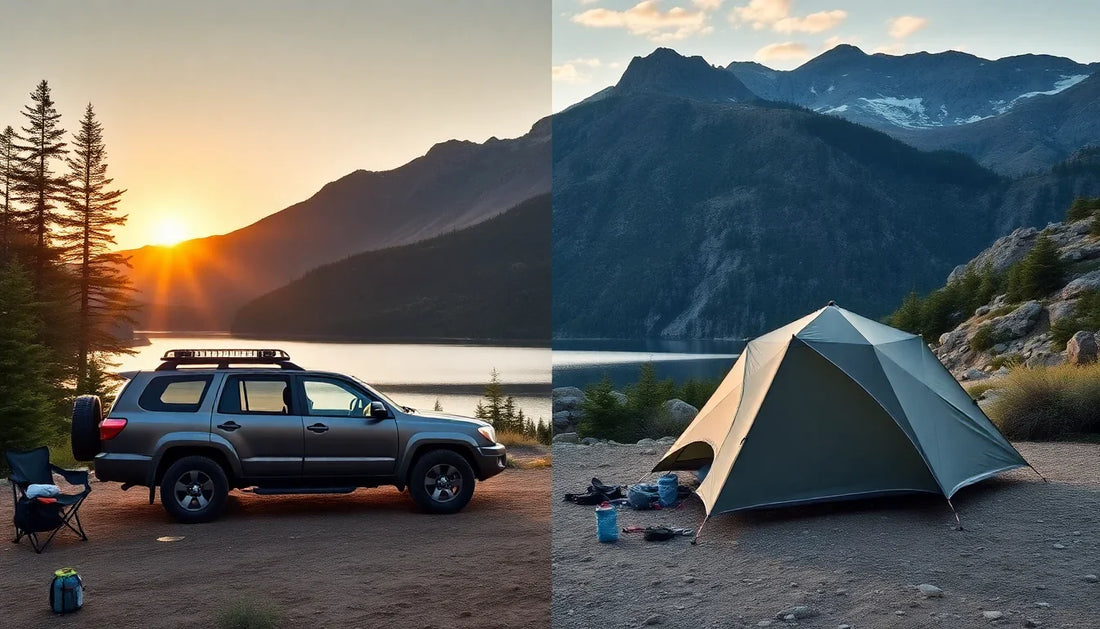
Car Camping vs Backpacking: Which Style Fits You Best?
Share
Embarking on a camping adventure can be an exhilarating and rejuvenating experience, but choosing the right camping style can make all the difference. Whether you prefer the convenience of car camping or the challenge of backpacking, each approach offers unique benefits and considerations. In this blog post, we'll explore the differences between car camping and backpacking, helping you determine which style best suits your preferences, fitness level, and overall camping goals.
Understanding Car Camping
Car camping is a popular choice for those seeking a more comfortable and accessible outdoor experience. It involves using a vehicle, such as a car, van, or RV, as a base camp, allowing you to bring more gear, supplies, and creature comforts. The key characteristics of car camping include:
- Accessibility: With your vehicle nearby, you can easily transport and access your gear, making it a great option for families, groups, or those with limited mobility.
- Comfort: Car camping allows you to bring larger, more luxurious items like air mattresses, camp chairs, and even small appliances, creating a more comfortable and relaxed atmosphere.
- Convenience: The proximity of your vehicle means you can easily resupply, change clothes, or take a break from the elements as needed.
The advantages of car camping include the ability to bring more gear, the opportunity to enjoy a higher level of comfort, and the convenience of having your vehicle nearby. This style is often best suited for those who prioritize relaxation, want to explore a specific area in-depth, or are camping with young children or elderly family members.
Understanding Backpacking
Backpacking, on the other hand, involves carrying all your necessary gear and supplies on your back, often for extended periods of time. This approach to camping is characterized by:
- Mobility: Backpacking allows you to cover more ground and access remote, off-the-beaten-path locations that may be inaccessible by vehicle.
- Minimalism: Backpackers must carefully select and pack only the essentials, prioritizing lightweight and compact gear to reduce the burden on their bodies.
- Challenge: Backpacking requires a higher level of physical fitness and endurance, as you'll be responsible for carrying all your belongings on your back.
The advantages of backpacking include the ability to explore more rugged and untouched environments, the sense of accomplishment from carrying all your gear, and the opportunity to immerse yourself in nature more deeply. This style is often preferred by experienced outdoor enthusiasts, adventure-seekers, and those looking to challenge themselves physically and mentally.
Comparison: Car Camping vs Backpacking
When it comes to choosing between car camping and backpacking, there are several key factors to consider:
Comfort Levels
Car camping offers a higher level of comfort, with the ability to bring larger and more luxurious items like air mattresses, camp chairs, and even small appliances. Backpacking, on the other hand, requires a more minimalist approach, with a focus on lightweight and compact gear.
Cost Considerations
Car camping generally requires a larger initial investment in equipment, such as a suitable vehicle, camping gear, and accessories. Backpacking, while still requiring quality gear, can be a more cost-effective option, especially for those just starting out.
Physical Requirements
Backpacking places a greater physical demand on the body, as you'll be responsible for carrying all your gear on your back. Car camping, in contrast, allows you to rely on your vehicle to transport the majority of your belongings.
Flexibility and Mobility
Backpacking offers more flexibility and mobility, as you can easily access remote and off-the-beaten-path locations. Car camping, while more comfortable, may be limited to designated campsites or areas accessible by vehicle.
Environmental Impact
Backpacking generally has a lower environmental impact, as you're carrying only what you need and leaving a smaller footprint. Car camping, with the use of a vehicle and the potential for larger campsites, may have a more significant impact on the surrounding environment.
Choosing Your Camping Style
When deciding between car camping and backpacking, consider the following factors:
- Personal Fitness Level: Assess your physical capabilities and endurance to determine if backpacking is a suitable option.
- Travel Goals: Determine if you're more interested in exploring a specific area in-depth or covering a larger, more diverse terrain.
- Budget Constraints: Evaluate your financial resources and the initial investment required for each camping style.
- Experience Level: If you're a beginner, car camping may be a more accessible and comfortable starting point.
- Terrain and Destination: Consider the accessibility and conditions of your desired camping location, as this may influence your choice.
Tips for First-Time Campers
For those new to camping, here are some tips to help you get started:
Car Camping Beginners:
- Start with a well-equipped vehicle and invest in quality camping gear.
- Research and choose campgrounds that offer amenities and easy access.
- Familiarize yourself with setting up your camp and using your equipment.
Backpacking Beginners:
- Begin with shorter, day hikes to build up your endurance and experience.
- Invest in high-quality, lightweight backpacking gear to reduce the burden.
- Practice packing and carrying your backpack before your first trip.
- Ensure you have the necessary navigation and survival skills.
Regardless of your chosen camping style, safety should always be a top priority. Research the area, pack essential supplies, and be prepared for unexpected situations.
Conclusion
Car camping and backpacking each offer unique experiences and advantages, catering to different preferences, fitness levels, and camping goals. By understanding the key differences between these two styles, you can make an informed decision on which approach best suits your needs and preferences. Whether you choose the comfort and convenience of car camping or the challenge and adventure of backpacking, the most important thing is to get out there and explore the great outdoors in a way that resonates with you.
